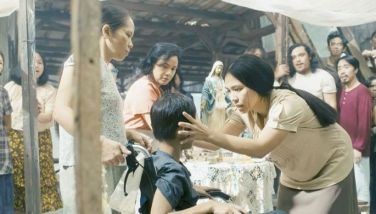Becoming unbroken
There’s a ring of trauma in the word “broken.” Almost immediately, when we hear of delinquent children, we try to trace the kind of family environment they grew up in. It is never easy for couples and their children to go through break-ups, but they don’t always produce stories of teleserye drama material. In the movies, children from broken families can be portrayed as rebels, dropouts or even as drug users. It may be anti-climactic, but broken marriages can produce good people. My parents are separated, but I’m uncomfortable using the term broken.
Despite the difficulties, I found support in friends and some priests, and brothers in Sto. Domingo Church. A trip to the Carmel Monastery in Gilmore, and that brief encounter with Sr. Mary Bernard was an inspiration. We all need an outlet, and I found mine in prayer.
There are many success stories that arise from broken families like that of People’s Champ Manny Pacquiao or that of a world-class beauty queen… Surely, broken families did not deter them from being achievers. Family expert Maribel Dionisio says that our parents influence the children in two ways: We either become like them, or we strive to be their opposite.
If there is anything good about experiencing challenges at an early age, it prepares us for greater challenges ahead and makes us stronger people.
Family background plays a pivotal role in person’s character, especially at an age where the child is trying to find and discover himself. Most crucial in a child’s life is between 12 to 17 years old, or what is called the “trouble years.” At that age, a teenager needs the guidance of parents the most as he is transitioning from childhood to adolescence. When a child is experiencing these emotional, physical and psychological changes, he needs a stable family foundation. Rocking the boat during puberty may be tricky, but not impossible.
Looking back, I feel that family problems have become more of a convenient excuse for rebellion. Reality is, family problems have always existed, broken or not. The influences outside the family, the support and the environment of the child are just as detrimental.
Blame media for too much drama, vulgarity and bad news. Take the shooting incident in Pampanga involving minors as an example. Some psychiatrists believe that the shooting incident in Pampanga may have been triggered by the shooting incident at SM North Edsa days before, also called the Copycat Syndrome. The World Health Organization came out with guidelines on how to report incidents of suicide and violence — with discretion and omission of certain graphic details because studies have proven that some individuals desiring attention by committing suicide imitate the act. Copycat.
It’s about time we take our role more seriously. Recommendations by the Anak TV as to which programs are child-friendly should be given weight by our networks.
The Internet, on the other hand, is the respite of the troubled youth. Too much information when unsupervised poses dangerous risks. Also, nowadays, everyone is part of a social network. Search a name and you can instantly find friends from decades ago. Giving out too much information makes one vulnerable to predators, which has been the case in numerous news reports about date rape.
What will become of our youth? Certainly, don’t just blame the family. The onset of absentee parents confronts us as Filipinos look for greener pastures abroad. Former Pres. Gloria Macapagal-Arroyo in 2004 formed the Presidential Commission for Values Formation asking the different church organizations to contribute in the values formation of the Filipinos. It is not clear what has happened to that program, but it sounds promising. We should not only address the economic needs of the family, but also the void in values of the children brought about by parents leaving the Philippines.
Some good news: Some members of the private sector have taken initiatives in promoting values formation, such as the National College of Science and Technology (NCST). Part of the curriculum of the school is to involve the students in social undertakings like bloodletting, and recently, the Chalk Para Kay Teacher drive of ABS-CBN. NCST president Emerson Atanacio believes that involving the students in charitable activities will make them better Filipinos. Upon hearing about our chalk drive, the students were able to raise some 300 boxes of chalk for our public school teachers overnight! Volunteerism and nation-building have become a culture for these college students.
(E-mail me at [email protected] and follow me on Twitter @bernadette_ABS.)
- Latest
- Trending



























